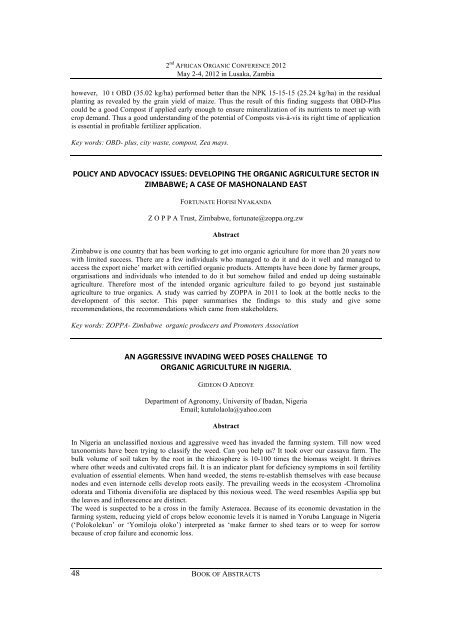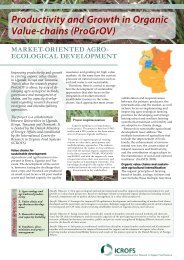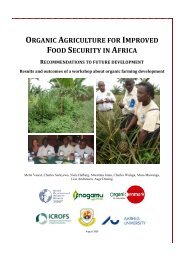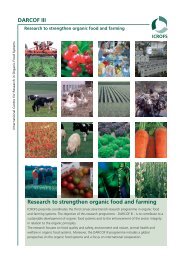The 2nd African Organic Conference â Mainstreaming ... - ICROFS
The 2nd African Organic Conference â Mainstreaming ... - ICROFS
The 2nd African Organic Conference â Mainstreaming ... - ICROFS
Create successful ePaper yourself
Turn your PDF publications into a flip-book with our unique Google optimized e-Paper software.
2 nd AFRICAN ORGANIC CONFERENCE 2012<br />
May 2-4, 2012 in Lusaka, Zambia<br />
however, 10 t OBD (35.02 kg/ha) performed better than the NPK 15-15-15 (25.24 kg/ha) in the residual<br />
planting as revealed by the grain yield of maize. Thus the result of this finding suggests that OBD-Plus<br />
could be a good Compost if applied early enough to ensure mineralization of its nutrients to meet up with<br />
crop demand. Thus a good understanding of the potential of Composts vis-à-vis its right time of application<br />
is essential in profitable fertilizer application.<br />
Key words: OBD- plus, city waste, compost, Zea mays.<br />
POLICY&AND&ADVOCACY&ISSUES:&DEVELOPING&THE&ORGANIC&AGRICULTURE&SECTOR&IN&<br />
ZIMBABWE;&A&CASE&OF&MASHONALAND&EAST&<br />
FORTUNATE HOFISI NYAKANDA<br />
Z O P P A Trust, Zimbabwe, fortunate@zoppa.org.zw<br />
Abstract<br />
Zimbabwe is one country that has been working to get into organic agriculture for more than 20 years now<br />
with limited success. <strong>The</strong>re are a few individuals who managed to do it and do it well and managed to<br />
access the export niche’ market with certified organic products. Attempts have been done by farmer groups,<br />
organisations and individuals who intended to do it but somehow failed and ended up doing sustainable<br />
agriculture. <strong>The</strong>refore most of the intended organic agriculture failed to go beyond just sustainable<br />
agriculture to true organics. A study was carried by ZOPPA in 2011 to look at the bottle necks to the<br />
development of this sector. This paper summarises the findings to this study and give some<br />
recommendations, the recommendations which came from stakeholders.<br />
Key words: ZOPPA- Zimbabwe organic producers and Promoters Association<br />
AN&AGGRESSIVE&INVADING&WEED&POSES&CHALLENGE&&TO&&<br />
ORGANIC&AGRICULTURE&IN&NJGERIA.&<br />
GIDEON O ADEOYE<br />
Department of Agronomy, University of Ibadan, Nigeria<br />
Email; kutulolaola@yahoo.com<br />
Abstract<br />
In Nigeria an unclassified noxious and aggressive weed has invaded the farming system. Till now weed<br />
taxonomists have been trying to classify the weed. Can you help us? It took over our cassava farm. <strong>The</strong><br />
bulk volume of soil taken by the root in the rhizosphere is 10-100 times the biomass weight. It thrives<br />
where other weeds and cultivated crops fail. It is an indicator plant for deficiency symptoms in soil fertility<br />
evaluation of essential elements. When hand weeded, the stems re-establish themselves with ease because<br />
nodes and even internode cells develop roots easily. <strong>The</strong> prevailing weeds in the ecosystem -Chromolina<br />
odorata and Tithonia diversifolia are displaced by this noxious weed. <strong>The</strong> weed resembles Aspilia spp but<br />
the leaves and inflorescence are distinct.<br />
<strong>The</strong> weed is suspected to be a cross in the family Asteracea. Because of its economic devastation in the<br />
farming system, reducing yield of crops below economic levels it is named in Yoruba Language in Nigeria<br />
(‘Polokolekun’ or ‘Yomiloju oloko’) interpreted as ‘make farmer to shed tears or to weep for sorrow<br />
because of crop failure and economic loss.<br />
48<br />
BOOK OF ABSTRACTS





